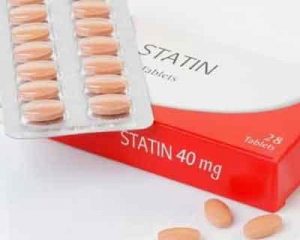- Home
- Editorial
- News
- Practice Guidelines
- Anesthesiology Guidelines
- Cancer Guidelines
- Cardiac Sciences Guidelines
- Critical Care Guidelines
- Dentistry Guidelines
- Dermatology Guidelines
- Diabetes and Endo Guidelines
- Diagnostics Guidelines
- ENT Guidelines
- Featured Practice Guidelines
- Gastroenterology Guidelines
- Geriatrics Guidelines
- Medicine Guidelines
- Nephrology Guidelines
- Neurosciences Guidelines
- Obs and Gynae Guidelines
- Ophthalmology Guidelines
- Orthopaedics Guidelines
- Paediatrics Guidelines
- Psychiatry Guidelines
- Pulmonology Guidelines
- Radiology Guidelines
- Surgery Guidelines
- Urology Guidelines
Controversy over statins risking thousands of hearts

Washington D.C : A period of controversy over the risks and benefits of statins, covered widely in the UK media, was followed by a temporary increase in the number of people stopping their statin treatment, finds a recent study.
The increase in stopping was seen among patients taking statins for existing heart disease (known as secondary prevention) as well as patients at high risk of developing disease in the next 10 years (known as primary prevention).
The researchers found no evidence that widespread media coverage was linked to changes in the proportion of newly eligible patients starting statins.
The results are observational, so no firm conclusions can be drawn about cause and effect. Nevertheless, the authors say they highlight "the potential for widely covered health stories in the lay media to impact on healthcare related behaviour."
But a linked editorial argues that uncertainty over the benefits and harms of statins still exists and journalism that exposes the public to ongoing controversies in science should be nurtured.
Statins are widely recommended for the prevention of cardiovascular disease (CVD). In October 2013, two articles were published in The BMJ that questioned the value of extending the use of statins to healthy people at low risk of heart disease, and these were heavily criticised by some statins researchers, prompting widespread media debate about their potential risks and benefits.
Anthony Matthews at the London School of Hygiene and Tropical Medicine and colleagues decided to measure how this period of intense public debate (from October 2013 to March 2014) affected the likelihood of patients starting and stopping statins for both primary and secondary prevention of CVD.
Using prescribing data from UK primary care records, they calculated the number of people aged 40 and over starting and stopping statins each month from January 2011 to March 2015.
Patients already taking statins were more likely to stop taking them for both primary and secondary prevention after the high media coverage period, particularly older patients and those with a longer continuous prescription.
The authors estimate that more than 200,000 patients across the UK may have stopped statin therapy in the six months after the media coverage and that this could lead to over 2,000 extra cardiovascular events, such as heart attacks and strokes, if continued over the next 10 years. But they stress that these calculations are based on several assumptions and should be interpreted with caution.
Study author Professor Liam Smeeth from the London School of Hygiene & Tropical Medicine said: "Our findings suggest that widespread coverage of health stories in the mainstream media can have an important, real world impact on the behaviour of patients and doctors. This may have significant consequences for people's health.
"It's undoubtedly important that these debates are reflected in the media, who play a key role in communicating public health advice, but there is a concern that in the case of statins, widespread reporting of the debate may have given disproportionate weight to a minority view about possible side effects, denting public confidence in a drug which most scientists and health professionals believe to be a safe and effective option against heart disease for the vast majority of patients."
In a linked editorial Gary Schwitzer, Publisher of HealthNewsReview.org, says "we should not rush to judgement on the media's role in this episode."
Dr Fiona Godlee, Editor in chief, The BMJ said: "It seems to me absolutely right that there is public debate about the benefits and harms of treatments. Patients may now be better aware of several things. First that we have far less good information on the side effects of statins than on their benefits. Secondly, that for some people, especially those at lower risk of heart disease, the survival benefit from statins may not outweigh the negatives of taking a drug every day with all that this entails. And finally that the complete trial data on statins are not available for independent scrutiny. This should shock people. It continues to shock me."
The study is published in The BMJ.

Disclaimer: This site is primarily intended for healthcare professionals. Any content/information on this website does not replace the advice of medical and/or health professionals and should not be construed as medical/diagnostic advice/endorsement or prescription. Use of this site is subject to our terms of use, privacy policy, advertisement policy. © 2020 Minerva Medical Treatment Pvt Ltd